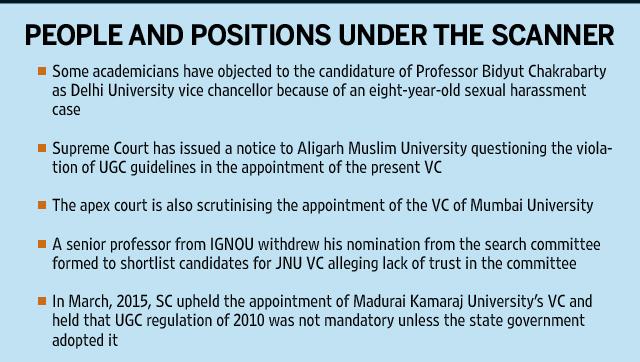No eligibility criteria defined for selection of vice chancellors
Though the process of appointment of VCs for Central and state universities has been examined by various academic committees in the past, the issue needs to be revisited once again, say experts.
The questions raised by academicians and women activists over the candidature of Professor Bidyut Chakrabarty for the position of Delhi University’s (DU) vice chancellor (VC) because of a 2007 sexual harassment case; and questions raised over the appointment of the VC of Aligarh Muslim University (AMU) and Mumbai University(MU), highlight the need for an eligibility criteria for appointment of VCs. Though the process of appointment of VCs for Central and state universities has been examined by various academic committees in the past, the issue needs to be revisited once again, say experts.

What also needs to be scrutinised by the powers that be is the accountability of the search-cum-selection committees, which shortlist names of the aspirants to VCs’ positions and send it to the President for approval.
The acts and statutes of almost all the universities in the country are silent on the eligibility criteria. What most academic institutes follow are the University Grants Commission (UGC) regulations on minimum qualifications for appointment of teachers and other academic staff in universities and colleges and measures for the maintenance of standards in higher education in 2010.
According to clause 7.3.0 of the UGC regulation, “Persons of the highest level of competence, integrity, morals and institutional commitment are to be appointed as vice chancellors. The vice chancellor to be appointed should be a distinguished academician with minimum of ten years of experience as professor in a university system or ten years of experience in an equivalent position in a reputed research and/or academic administrative organisation.”
Unfortunately, this regulation isn’t binding on many universities, so a number of them, including DU, haven’t adopted it. In many cases, a search-cum-selection committee has been given a free hand to select and shortlist candidates. Cases of violations of the regulation have also come to light in many universities.

Legal experts and academicians are of the view that these regulations should be made mandatory and reformulated. Members of the search-cum-selection committees should also be made accountable for their decisions.
Advocate Prashant Bhushan, who argued in the Supreme Court in the matter of AMU and MU, is of the view that the UGC regulation is legally binding on all Central universities and it should be binding on state universities as well. “The situation is bad as everyone is flouting it but it should be stopped,” he says.
Eminent academician, researcher and chemical scientist, Prof Goverdhan Mehta says that the present system -- the way in which it has been structured and the selection process of VCs, has its fault lines. “Today, the search committees formed to select VCs have no accountability. You mess up things by appointing someone in one university and disappear and then sit in the next search committee. Why is this happening?” he asks.
Read more: Did politicians interfere in UGC appointment?
Calling for a well-defined process and criteria for the selections of VCs in the country, Mehta says, “The UGC regulation says ‘a professor with ten years experience.’ We know how professorships have proliferated in the last few years through various programmes and career advancement schemes. So though most professors and faculty in universities might have ten years of experience, we don’t know how they became professors in the first place.”
Mehta adds, “The UGC regulation doesn’t deal with calibre and academic credentials of an individual. The most important criterion in selection should be the academic standing of the individual in his or her domain. Administrative acumen should also have with it the credibility and moral authority which comes from one’s track record and professional competency. We need a framework which has some element of flexibility and also an element of rigor.”
MM Ansari, former UGC member, agrees, adding that “Selection of an academic leader who can promote the vision and mission of the university should be the main criteria.”
Noted academician NR Madhava Menon also agrees that search committees should be made accountable for their selections. Guidelines or parameters for the committees within which they should function, however, are not required, he says. “Search committees should function on their own, but they should know what kind of vision the aspirants to the vice chancellor’s position have. The chancellor should then take a call two years into the VC’s tenure as to how much of this vision has been implemented,” says Menon.











